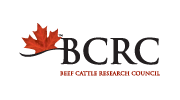Making Forage and Beef Research Results Accessible to All
| Project Code: | 2.10 |
| Completed: | December 2003 |
Project Title:
Foragebeef.ca Website (www.foragebeef.ca)
Researchers:
Duane McCartney
The majority of the Canadian land base used for agricultural production is comprised of forage crops. This land, used for livestock grazing and production of forage crops, covers over 36 million hectares (ha) of Canada’s land base, compared to 25 million ha in grain and oilseed crops. Of this 36 million, 72 per cent is native range (26 million ha), 11 per cent is cultivated pastures (four million ha) and 17 per cent is forage crops (six million ha).
With so much of Canada’s agricultural land dedicated to forage production, it is no surprise that every year numerous research projects are carried out that focus on how to best manage forage crops and the livestock that they nourish. This research however, was often difficult to access. There was an identified need to have research results compiled in one place and in a format that is readily accessible and comprehensible to forage and beef producers across Canada.
Internet usage among producers is on the rise (69 per cent of Canadian producers were using the Internet in 2006, according to an Ipsos-Reid poll). With this in mind and taking into account the ease with which a website can be updated, forage researchers at the Agriculture and Agri-Food Canada Research Station in Lacombe, Alberta decided to launch a website that would enable forage and beef producers to easily access the latest research results, news and information about forage production in Canada.
After four years of development, www.foragebeef.ca was officially launched in December 2003. The benefits of the website are twofold: it provides scientists and researchers the means to provide the results of their research to farmers and ranchers and the structure of the website is designed around the needs of farmers and ranchers. Information is clearly indexed directly from the home page and topics fall under two categories: Cow-Calf Information and Forage Information.
When a topic under one of the two main categories is clicked on, it is further broken down. For example, the Forage Information category contains the topic Extended Grazing Season. Clicking on Extended Grazing Season will bring up several sub-topics such as Extended Grazing Using Stockpiled Forages, Extended Grazing with Annuals, Extended Grazing with Brassicas, Extended Grazing with Perennials, and Swath Grazing.
The website designers also recognized that producers are busy business people and often do not have the time to read a full research paper. To meet the needs of these people, the website includes “Knowledge Nuggets” which are summaries of the latest research findings and can be quickly reviewed. It also includes the best fact sheets on the subject for those looking for greater detail and downloadable research papers for those who want more in-depth information on the subject.
Additional features of the website include links to updated weather and market information for cattle and crops and regularly updated news items that pertain to forage production and livestock. It also considers the needs of rural-dwelling producers who often access the Internet via dial-up phone lines by keeping graphics to a minimum to facilitate easy downloading.







